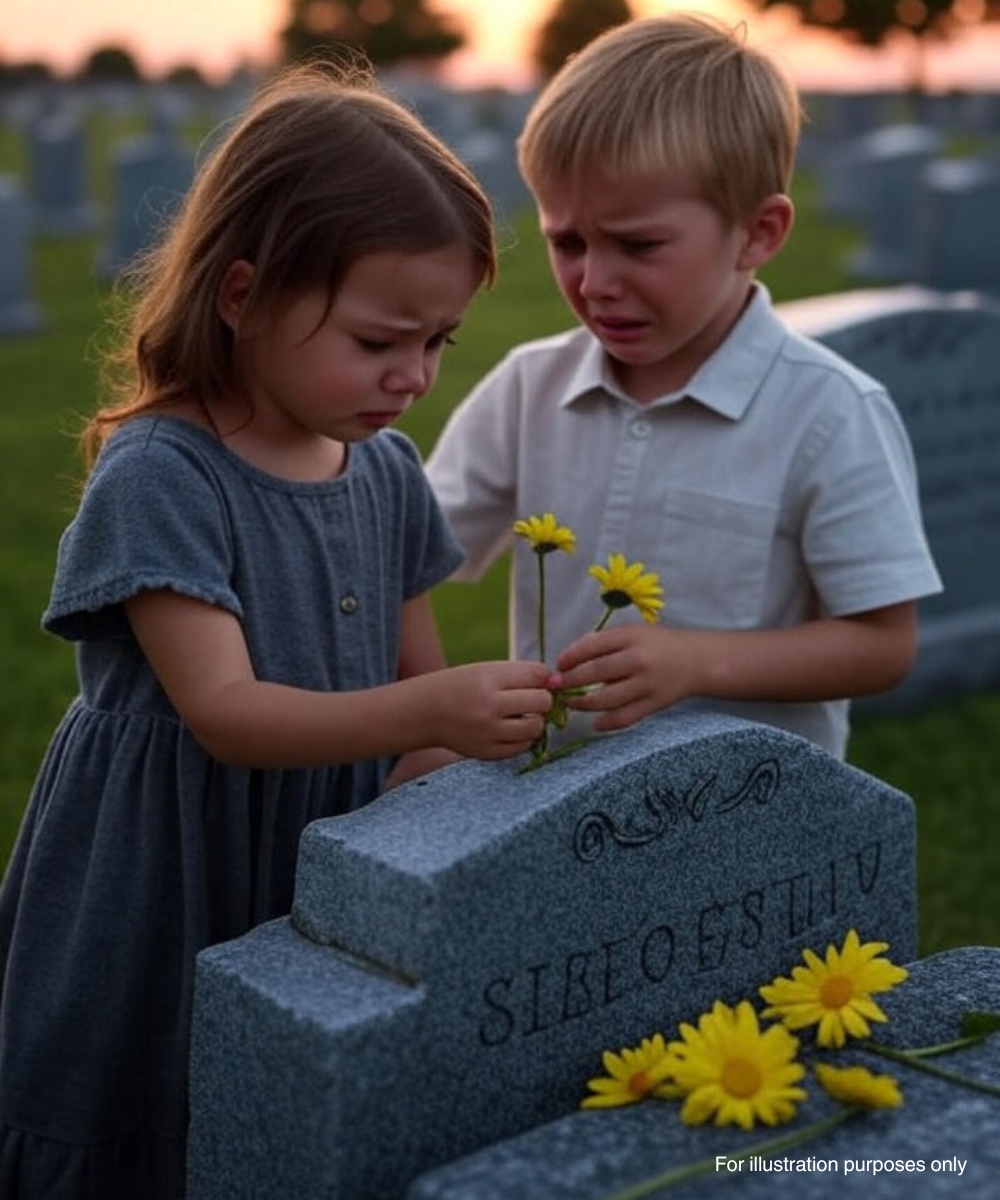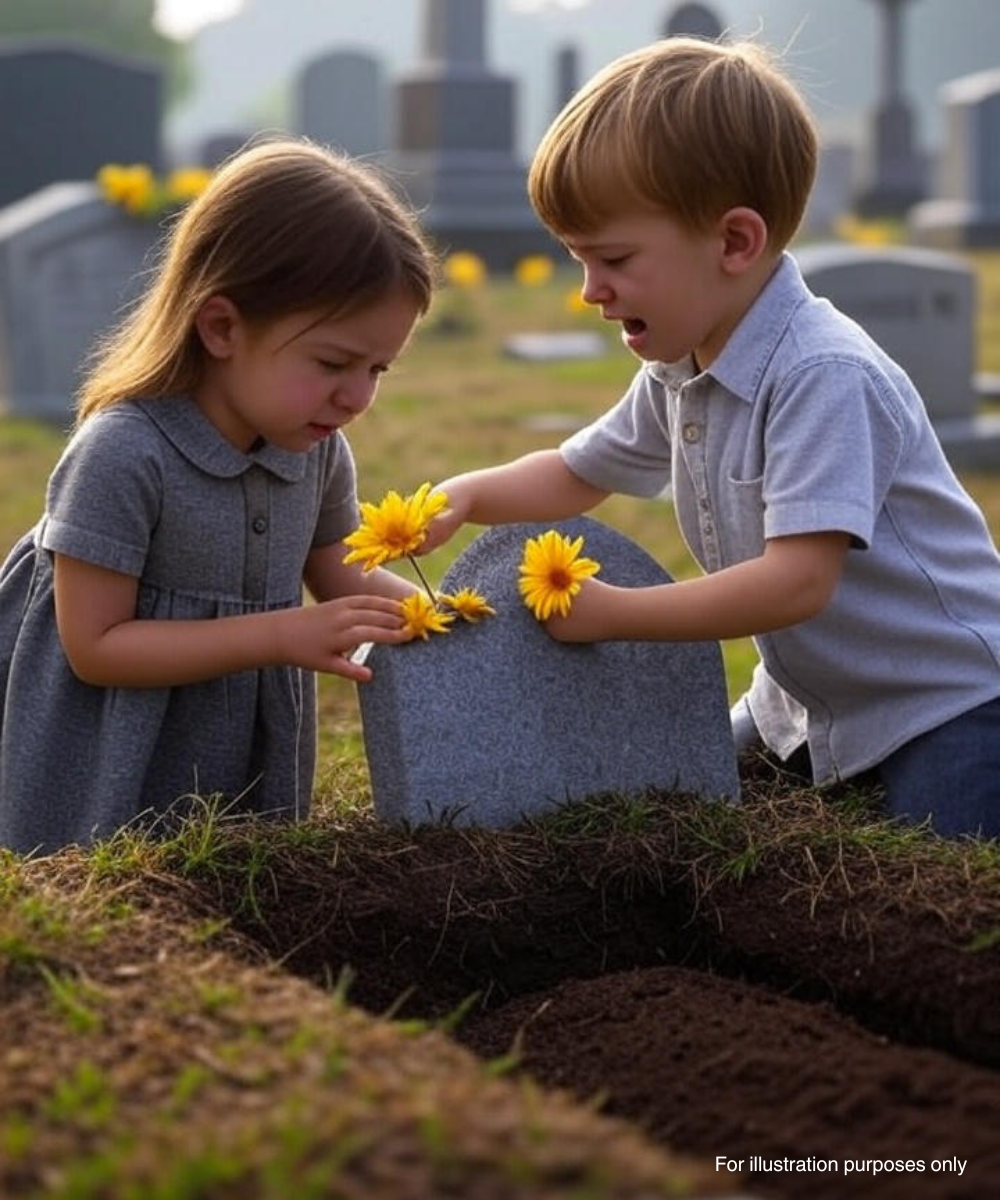They were too young to understand when she passed.
I remember holding them both at the service—one on each hip—while trying not to fall apart myself. I told them she was in the sky now, watching us. That she loved them more than cookies and cartoons combined.
Now they’re five. Old enough to ask questions. Old enough to remember.
We go every year on her birthday. Bring yellow daisies—her favorite. Take a photo “to show her we visited,” just like I promised.
This year, Ellie wore her twirliest gray dress—“because Nana liked spinny ones.” Drew wore his little button-up shirt, half unbuttoned before we even got through the gate.
They hugged in front of her stone, same as always. It was supposed to be a quick visit—flowers, a photo, a few quiet minutes.
But then Drew pointed.
“That box wasn’t there last year.”
He was right.
At the base of her stone, tucked under the bouquet, was a small wooden box. Polished. Clean. Like someone had just placed it there that morning.
No name. No writing.
I opened it with shaking hands.

Inside: a bundle of old black-and-white photographs—and a letter. Yellowed with time. Carefully folded.
Ellie tugged my sleeve. “Is it from Nana?”
“I don’t know, baby,” I whispered. But my heart was already pounding.
The letter wasn’t addressed to anyone. Just a short note, written in delicate cursive:
“To the one who loved her most,
I couldn’t say it back then.
But I hope these help you understand.
– C.”
I sat back on my heels, glancing around the quiet cemetery, half-expecting someone to be watching us from behind a tree or nearby gravestone.
But there was no one.
The kids were chasing birds in the grass. Oblivious.
I started flipping through the photos.
My mom appeared in several—young, radiant, laughing. And always beside the same man. Tall. Broad shoulders. Kind eyes.
And then one stopped me cold.
It was her. And him. Outside the old bakery on 5th Street. She was pregnant in the photo. That was me.
I flipped it over. Faint pencil writing:
“Fall ‘91 – J & C & Baby.”
Not my dad.
I was sure of it.
“Who’s that?” Ellie asked, pointing at the man.
“I… don’t know,” I replied. But maybe I was lying to both of us.
That night, after the kids were asleep, I called Aunt Sylvia. My mother’s older sister. The family’s unofficial historian.
“Do you know someone named ‘C’?” I asked. “Someone who knew Mom?”
A long pause.
Then a sigh.
“I wondered when that box would show up.”
My heart skipped.
“You knew?”
“She made me promise,” Sylvia said gently. “If she was gone more than five years, and you still visited, I could leave it.”
I clutched the phone tighter. “Who was he?”
“His name was Jonah,” she said. “Your mom’s first love.”
“But I thought Dad—?”
“She loved your dad, too. But Jonah… was different.”
“Why didn’t they end up together?”
“He disappeared. Left town one day without saying goodbye. Two years later, he mailed that letter. Said he was sick. Didn’t want her to watch him fade. Asked her not to come find him.”
I stared at the letter again, reading between the lines.
“She kept it?” I asked.
“Every year, on her birthday,” Sylvia said. “She’d read it, cry a little, then tuck it back in the box.”
The next morning, I took the kids to 5th Street. The bakery was long gone. Just a boarded-up laundromat now. But I remembered the smell of cinnamon rolls from when I was small.
“Why are we here?” Ellie asked.
I knelt down. “Because this is where Nana once stood when she was really happy.”
She nodded like it made perfect sense.
That night, I slipped a beach photo of the kids and me into the box. Wrote on the back:
“She raised us with love.
Thank you for being part of her story.”
I returned it to her grave.
I didn’t expect what happened next.
Three weeks later, a letter arrived. No return address.
“I’m Jonah’s niece. He passed in 1995.
He left a request: if someone ever left a photo at her grave, I should find them.
He wanted you to have this.”
Inside: a key.
And an address.
Vermont.
I don’t know what made me go.
Curiosity, maybe. A quiet ache. A need to see the rest of a story that had been hidden my entire life.
I left the kids with their dad and drove alone. Winding roads led to a white cottage by a still lake.
A man about my age met me at the door.
“I’m Grant,” he said. “Jonah was my uncle.”
He led me inside.
“One room he told me not to open until someone brought a photo with a beach in it.”
We stepped in.
And I stopped breathing.

Every wall was covered with my mother.
Photos. Newspaper clippings. Poems. Sketches. Even a cassette labeled “Her Laugh.”
I stood in the middle, stunned.
“He was obsessed,” Grant said. “But not in a bad way. Just… deeply in love.”
“Why didn’t he ever try to reach out again?”
Grant shook his head. “He wrote letters he never mailed. Said he didn’t want to ruin her new life.”
He handed me the box. “Do you want them?”
I nodded.
I drove home with a different kind of weight in my car. Not grief. Not guilt.
Just… clarity.
That night, I read every letter. Some made me smile. Others cracked me open.
But the last one—dated days before Jonah died—read:
“I hope one day her daughter finds me.
I hope she knows her mother was someone’s once-in-a-lifetime.”
I cried harder than I had in years.
Not from pain.
From understanding.
I told the kids about Jonah—just enough for their age.
“Sometimes, people love each other even if they don’t get to stay,” I said.
“Like in the movies?” Drew asked.
“Exactly,” I smiled. “Except this one’s real.”
The next time we visited Nana, the kids brought two flowers each.
“One for Nana,” Ellie said. “And one for the man who loved her.”
Now, one of Jonah’s sketches hangs on our living room wall—right above the kids’ art.
Because honoring the past doesn’t mean living in it. It means letting it stand beside the present. Adding to it. Deepening it.
Love like that doesn’t end.
It echoes.
Like laughter in the next room.
